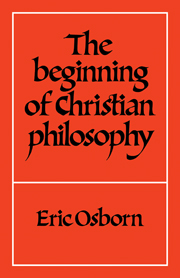Book contents
- Frontmatter
- Contents
- PREFACE
- REFERENCES
- ABBREVIATIONS
- 1 CHRISTIAN ARGUMENT
- 2 PEOPLE AND PLACES
- 3 THE GOD ABOVE
- 4 THE RATIONAL LAUGHING ANIMAL
- 5 COSMOS AND CREATION
- 6 HISTORY
- 7 THE SHORT WORD
- CONCLUSION
- APPENDIX
- BIBLIOGRAPHY
- INDEX OF BIBLICAL CITATIONS
- INDEX OF CITATIONS FROM ANCIENT AUTHORS
- INDEX OF CITATIONS FROM MODERN AUTHORS
- GENERAL INDEX
- Frontmatter
- Contents
- PREFACE
- REFERENCES
- ABBREVIATIONS
- 1 CHRISTIAN ARGUMENT
- 2 PEOPLE AND PLACES
- 3 THE GOD ABOVE
- 4 THE RATIONAL LAUGHING ANIMAL
- 5 COSMOS AND CREATION
- 6 HISTORY
- 7 THE SHORT WORD
- CONCLUSION
- APPENDIX
- BIBLIOGRAPHY
- INDEX OF BIBLICAL CITATIONS
- INDEX OF CITATIONS FROM ANCIENT AUTHORS
- INDEX OF CITATIONS FROM MODERN AUTHORS
- GENERAL INDEX
Summary
The four writers, Justin, Irenaeus, Tertullian and Clement, come from four major cities and centres of Christianity: Rome, Lyons, Carthage and Alexandria.
Justin
In the second century, Rome continued to enjoy prosperity. While literature lost some of its power, building and sculpture went on vigorously. Trajan's forum, the baths of Caracalla, the palace of Septimius Severus on the Palatine, the Pantheon and Hadrian's mausoleum remain as evidence of great activity. The period of the Antonines was, said Gibbon, the greatest period of Rome. Wars were few and there was prosperity on many sides. Yet disquieting signs may be found, and a recent picture of the period speaks of it as an age of anxiety : men knew that the best was past and the unknown future had little to lure them on. There is truth in both these opinions, for it was the best of times and the worst of times; the general position of the empire was sound but there was intellectual insecurity.
Christians were to be found in small groups, which met in houses and recognised the oversight of a college of presbyters, and before long the presidency of one bishop. Heretics like Marcion and Valentinus met a strong opposition at Rome, for there the movement towards right belief was strongest. There was tension between Rome and the East on the date of Easter, and attempts at reconciliation were not successful.
- Type
- Chapter
- Information
- The Beginning of Christian Philosophy , pp. 18 - 30Publisher: Cambridge University PressPrint publication year: 1981



